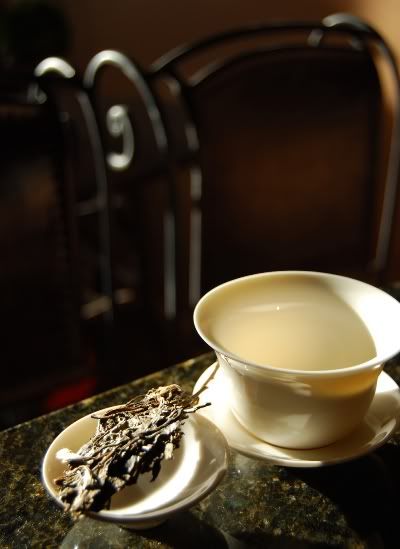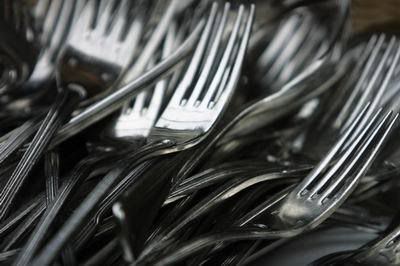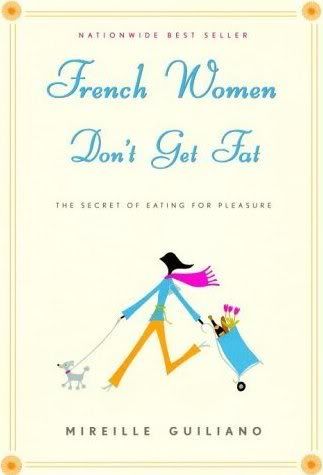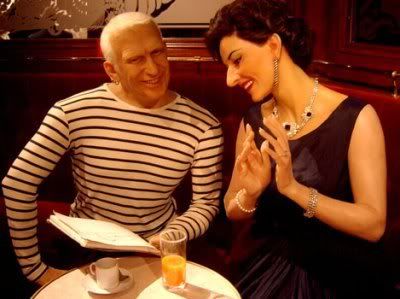I promised myself on arrival in the USA that I wouldn't write this article, primarily because it's not much to do with tea. However, a surprising number of e-mails have been asking the same question, so let's see what happens.
If you're from the USA and easily offended, or passionately patriotic, please look away now. Consider yourself warned...
If you're from the USA and easily offended, or passionately patriotic, please look away now. Consider yourself warned...

Regular victims readers of the Half-Dipper will recall that I write my articles in pen-and-paper format, then transcribe some of the tea-related work into these shabby HTML pages. Over a gaiwan of 2007 autumnal Xizihao (pictured above), I penned the following "first impressions" of the USA, from the perspective of an English newcomer. For those of you that asked for them, I hope these observations amuse. For those more easily offended, note that this was written light-heartedly and should be taken as such. Caveat emptor.
To give you the context in which my observations took place, it is true that the ski resort in which we find ourselves is highly unrepresentative of "normal USA life". However, we've met people from almost every American state (including Alaska) while here. Also, we're here for a conference which has attracted over 700 academics and industrialists from all over the USA. So, while Big Sky is atypical, I think that the slice of professionals and holidaymakers we've encountered have given us a good taste of American life as it is lived across the USA.
Here's a tacky conference freebie - can you see Yunnan?
To give you the context in which my observations took place, it is true that the ski resort in which we find ourselves is highly unrepresentative of "normal USA life". However, we've met people from almost every American state (including Alaska) while here. Also, we're here for a conference which has attracted over 700 academics and industrialists from all over the USA. So, while Big Sky is atypical, I think that the slice of professionals and holidaymakers we've encountered have given us a good taste of American life as it is lived across the USA.
Here's a tacky conference freebie - can you see Yunnan?

As a prelude, let me state for the record that I am fully aware of the shortcomings of England and the English. However, let us now turn our attention towards those first impressions of the USA...
Before we get too far in, I should also state that if you're a cowboy, raising cattle or sheep...

or if you're a trapper, driving teams of dogs in front of your toboggan...

...then this article is not about you. You can behave however you wish, as I think you've earned the right to do so through the sheer ruggedness and awesomeneity of your occupation. Go in peace.
This article is really aimed at the urban section of US society, as I have observed it passing through Big Sky and the cities we stopped in (Washington, Denver, Bozeman) on the way. City people. Academics, industrialists, commercialists, businessmen.
The first thing that strikes me about American life occurs...
At the Dinner Table
The average level of table manners I've seen here roughly equates to those of a misbehaving European five-year-old. I have seen the following in everyone from directors of MIT laboratories to the business leads of multinational corporations. From the "family guy" enjoying the resort with his children (bless 'em) to the table of professionals, trying to land new projects and job opportunities with one another. Whether the situation is formal or relaxed, it raises eyebrows every time from me - it's a huge gaping chasm of a cultural difference.
Looking around the restaurants, dining halls, and functions, I have seen committed virtually every mealtime sin that school and family have worked out of me during my formative years. I can imagine my grandmother eating with an American and turning purple with quiet rage. "Manners maketh the man", she always likes to quote. I suspect even my mild-mannered gran would have assaulted most Americans with their own unused cutlery by the end of the meal.

Let's start at the top:
1. Cutlery
Notice that a fork (or number thereof) has been positioned to the left of the dining area, while a knife (or knives) has been positioned to the right. This is an immediate clue as to their usage. Though manners insist on a certain grip on each implement (do NOT hold them like a pencil, or like a dagger!), I won't yet get that far as it is clear that most Americans I have watched eat are uncomfortable with the notion that the fork goes in the left, the knife goes in the right. (If you're a lefty, you may switch hands.)
I watched with mild tachycardia this morning as a respectably-dressed woman picked up the knife and fork correctly, then started to chop her food up into small cubes. The entire plateful. She then dropped the knife, moved the fork into the right hand, and started shovelling the small cubes into her mouth as if she were stoking coal into a steam engine.

If you are five months of age, you can cut your food into chunks. If you plan to eat the entire meal with chopsticks (my wife is reading this), you can hope for your food to already be cut into chunks for you. If you are a professional leader of business, talking important talk with your peers over the dinner table, and attempting to land multi-million pound contracts with your dining partner, you may not cut your food into chunks, nor may you shovel.
Try and convey the impression that your life doesn't depend on downing your meal within five minutes. What we're aiming for, as a pleasant side-effect of eating small pieces of food spaced comfortably apart, is the ability to maintain polite conversation without the need to swallow a volleyball-sized mass of unchewed food.
It goes without saying that you never, ever open your mouth or speak with food in there... but most of the folk I have dined with seem intent on showing me their undigested food. Again, my gran would probably be reaching for the sharpened butterknife with an eye to attacking you right about now.

2. Taking Food
In Europe, it is a grievous social faux pas to waste food, which is considered to be a sign of immense vulgarity (and will often be labelled "nouveau riche"). If you are advantaged, to not waste food is important in that ultimate goal of showing that you do not take your advantages for granted, and that you appreciate them. Check out the behaviour of HRH Liz II ("The Queen") for plentiful examples. Wastage is "gauche".

(I think Ronald looks a little like the hippo, don't you?)
In every food situation I have observed here in the US, the wastage of food is extreme. From a European viewpoint, it is literally incredible. Just because something is "free" doesn't mean that you should take a mountain of it. I see children taking six doughnuts for breakfast, nibbling one, discarding the rest, and then listening to their parents make a light-hearted comment about it. I see a famous academic taking three steaks at a conference buffet, eating one, and leaving the rest for the bin.
A piste-side restaurant served a plate of nachos that was over 3lbs in weight (approximately the volume of four human stomachs). The recipient ate one third of the pile, and ditched the rest. Then, another similar-sized plate landed on a young man's table next to us...
For Europeans, this enters the realms of actual revulsion. Curb that consumption!
3. Selecting Food
I love American optimism in all situations, but particularly when choosing which foods to eat: I wish that I too could eat without regard for the physical consequences. I see steaks wrapped in bacon, then covered in butter; I see cuts of meat served as single portions so large that they could feed a small family of tigers; I see beverages filled with modified corn starch and sweetening agents. It looks like a wonderland, where the food we select will have no observable effect on our bodies... but that's not quite the case.
Back at school, the "fat kid" in most classes used to be the one singled out and humiliated. It's not pleasant behaviour in children, and obviously needs to be halted if it's encountered, but it was almost ubiquitous. Children love to ridicule the flaws in others - perhaps it's an evolutionary thing. However, its commonplace presence alone indicated that the "fat kid" used to be unusual.
It used to be unusual to be overweight.
Certainly in the UK, as people begin to eat poorer foods and take less responsibility for their bodies, it's not unusual to be overweight any more. (Amusingly, in the "classroom" of European nations, the "skinny kids" of France and Italy now ridicule the "fat kid" which is England.)
Entering the US feels as if the situation is further exacerbated here. To see someone "normal" in weight, looking around a dining hall filled with hundreds of people, or a conference dinner filled with delegates, is really rather unusual.

It doesn't take a genius to realise that eating more calories than the body requires leads to the accumulation of fat. Portions in the US are about double or triple European sizes, and so I suspect that this culturally-instituted factor makes it harder to fight chubbiness, as an American. If your school serves you grossly large portions of food, as do your restaurants, your friends, and perhaps even your parents, it surely must be difficult to take only the food you require.
Europeans simply eat less. There's a great book out there (pictured above) which makes exactly this point. It's important to realise, given that a lot of us live sedentary lives, stuck in front of computers.
Europeans are wholly unpleasant in many other areas, but I think we're generally less fat. Particularly those darned French (pictured below, ignoring the fact that Maria Callas is Greek).

OK, that's it for now. I was about to get onto dress sense and conversations, but I don't think there's enough ink left in my computer.
Looking around the restaurants, dining halls, and functions, I have seen committed virtually every mealtime sin that school and family have worked out of me during my formative years. I can imagine my grandmother eating with an American and turning purple with quiet rage. "Manners maketh the man", she always likes to quote. I suspect even my mild-mannered gran would have assaulted most Americans with their own unused cutlery by the end of the meal.

Let's start at the top:
1. Cutlery
Notice that a fork (or number thereof) has been positioned to the left of the dining area, while a knife (or knives) has been positioned to the right. This is an immediate clue as to their usage. Though manners insist on a certain grip on each implement (do NOT hold them like a pencil, or like a dagger!), I won't yet get that far as it is clear that most Americans I have watched eat are uncomfortable with the notion that the fork goes in the left, the knife goes in the right. (If you're a lefty, you may switch hands.)
I watched with mild tachycardia this morning as a respectably-dressed woman picked up the knife and fork correctly, then started to chop her food up into small cubes. The entire plateful. She then dropped the knife, moved the fork into the right hand, and started shovelling the small cubes into her mouth as if she were stoking coal into a steam engine.

If you are five months of age, you can cut your food into chunks. If you plan to eat the entire meal with chopsticks (my wife is reading this), you can hope for your food to already be cut into chunks for you. If you are a professional leader of business, talking important talk with your peers over the dinner table, and attempting to land multi-million pound contracts with your dining partner, you may not cut your food into chunks, nor may you shovel.
Try and convey the impression that your life doesn't depend on downing your meal within five minutes. What we're aiming for, as a pleasant side-effect of eating small pieces of food spaced comfortably apart, is the ability to maintain polite conversation without the need to swallow a volleyball-sized mass of unchewed food.
It goes without saying that you never, ever open your mouth or speak with food in there... but most of the folk I have dined with seem intent on showing me their undigested food. Again, my gran would probably be reaching for the sharpened butterknife with an eye to attacking you right about now.

2. Taking Food
In Europe, it is a grievous social faux pas to waste food, which is considered to be a sign of immense vulgarity (and will often be labelled "nouveau riche"). If you are advantaged, to not waste food is important in that ultimate goal of showing that you do not take your advantages for granted, and that you appreciate them. Check out the behaviour of HRH Liz II ("The Queen") for plentiful examples. Wastage is "gauche".

(I think Ronald looks a little like the hippo, don't you?)
In every food situation I have observed here in the US, the wastage of food is extreme. From a European viewpoint, it is literally incredible. Just because something is "free" doesn't mean that you should take a mountain of it. I see children taking six doughnuts for breakfast, nibbling one, discarding the rest, and then listening to their parents make a light-hearted comment about it. I see a famous academic taking three steaks at a conference buffet, eating one, and leaving the rest for the bin.
A piste-side restaurant served a plate of nachos that was over 3lbs in weight (approximately the volume of four human stomachs). The recipient ate one third of the pile, and ditched the rest. Then, another similar-sized plate landed on a young man's table next to us...
For Europeans, this enters the realms of actual revulsion. Curb that consumption!
3. Selecting Food
I love American optimism in all situations, but particularly when choosing which foods to eat: I wish that I too could eat without regard for the physical consequences. I see steaks wrapped in bacon, then covered in butter; I see cuts of meat served as single portions so large that they could feed a small family of tigers; I see beverages filled with modified corn starch and sweetening agents. It looks like a wonderland, where the food we select will have no observable effect on our bodies... but that's not quite the case.
Back at school, the "fat kid" in most classes used to be the one singled out and humiliated. It's not pleasant behaviour in children, and obviously needs to be halted if it's encountered, but it was almost ubiquitous. Children love to ridicule the flaws in others - perhaps it's an evolutionary thing. However, its commonplace presence alone indicated that the "fat kid" used to be unusual.
It used to be unusual to be overweight.
Certainly in the UK, as people begin to eat poorer foods and take less responsibility for their bodies, it's not unusual to be overweight any more. (Amusingly, in the "classroom" of European nations, the "skinny kids" of France and Italy now ridicule the "fat kid" which is England.)
Entering the US feels as if the situation is further exacerbated here. To see someone "normal" in weight, looking around a dining hall filled with hundreds of people, or a conference dinner filled with delegates, is really rather unusual.

It doesn't take a genius to realise that eating more calories than the body requires leads to the accumulation of fat. Portions in the US are about double or triple European sizes, and so I suspect that this culturally-instituted factor makes it harder to fight chubbiness, as an American. If your school serves you grossly large portions of food, as do your restaurants, your friends, and perhaps even your parents, it surely must be difficult to take only the food you require.
Europeans simply eat less. There's a great book out there (pictured above) which makes exactly this point. It's important to realise, given that a lot of us live sedentary lives, stuck in front of computers.
Europeans are wholly unpleasant in many other areas, but I think we're generally less fat. Particularly those darned French (pictured below, ignoring the fact that Maria Callas is Greek).

OK, that's it for now. I was about to get onto dress sense and conversations, but I don't think there's enough ink left in my computer.

31 comments:
As an American, I have to say I was not offended at all by this. Everything you say is true. Perhaps not true of all Americans, but certainly of a large number.
You will be happy to know that there are some of us who do not pass cutlery between hands and appreciate "continental" etiquette. :)
Mostly, it's an issue of not being raised to be conscious of it. My father is fairly well-travelled, so he taught me well (though I never remember how to use that darned fish knife), but I'm one of a precious few with such luck, it seems.
This reminds me of something Oscar Wilde said: "America is the only country that went from barbarism to decadence without civilization in between."
I have enjoyed reading this post and I can only imagine what you might have written on the underdressing of America that has appeared in the last few decades. If you came during hotter weather it would be even worse. :)
I assure you that the fat epidemic in this country has institutional roots, having to do, ultimately, with overproduction of corn. "The Omnivoire's Dilemma" is a great read that touches on the issue. I'm with you all the way WRT wastefulness, and the culture here encourages it. If you refuse to waste food, you're thought of as "quaint" at best. I find that conceit morally offensive, irrespective of surplus. I wouldn't make a good member of the "wealthy" class here, which is fine with me. Manners, OTOH, are a quirky issue for me. While I like to see others eat with conscious consideration of taste, texture, etc., I wouldn't get my knickers in a twist over which hand the fork was in. (And that's a well-known point of divergence between "proper" English and American dining etiquette, BTW, not that I care.) For me, good manners has much more to do with balancing a thoughtful and lustful appreciation of food for the sensual experience that is eating. Good manners for me is all about mindful enjoyment. For me, the mindfulness part of it is learned; my family shovels their food. I never knew whether mindfulness had really become integrated into my eating habits (I fix them every time I notice I'm shovelling) until a stranger I was dining with said "I can tell you do yoga, because you eat thoughtfully". Never could any compliment have better made my day. But American women of French extraction do get fat; mindfulness notwithstanding, it's been a constant struggle for me every day after age 35.
Don't you think it is the least bit arrogant to presuppose your particular frame of reference is the proper one? At the very least it is colored by your particular social station, etc. I can assure you I have seen just as much "improper" and strange behavior in my travels. Just accept that the human race is incredibly varied and enjoy your tea.
I agree with anonymous as far as comments about which hand to use with which piece of cutlery coming off as nitpicky, but American overeating and wastefulness are objectively damaging trends, that I wish there was more consciousness of. Personally, I try to take only as much as I'm willing to eat, and almost always finish everything on my plate, even if it's in a restaurant and I've been served too much, but it's disappointing to see how few of my friends act similarly.
Dear Brent,
I love Oscar Wilde's wit; I was hoping for something along those lines, but couldn't find anything, so I really appreciate the quote!
Regarding continental etiquette, I wouldn't want the whole world to adopt our conventions, but it is important to know (particularly in a professional situation) how one will come across to foreign people with the kind of behaviour I've witnessed. Presumably, those professors were trying to make a good impression, secure research deals and partnerships, etc. - but their verbal communication is hindered by the fact that their social behaviour is straying onto "unacceptable" by other cultural standards. Everyone's free to do what they want in their own home, but manners are the public mechanism used to stop us wanting to kill one another, and exist for a reason.
If one is only communicating with others from the same cultural background, who cares how we behave? Surely, though, no one wants to make complete fool out of themselves in front of others from different cultures. :)
Dear Doddy,
I've got pages on dress sense, but no time to type them up. I know you're with me on this one.
Dear Carla,
I like the notion of mindfulness when enjoying food. That's definitely part of it, but there's also another part (as above) about manners being the art of avoiding offending others. Social defence!
Dear Anonymous,
I had hoped with my large number of caveats and warnings that I had made it clear that this is a humourous piece, and that I am the last of all people that should be criticising people with whom I have had only superficial contact. If that's not obvious from my writing, I hope it's clear now.
That said, there are some common traits that are unpleasant across all human societies, independent of our travels. Waste is generally considered bad, disrespect for others is bad (open mouth while talking, leaning over others), disrespect for one's food and body is bad.
I don't think I'm stating anything revolutionary here. As I said in the article, take it in the spirit in which it was written. I'm just a foreigner telling you how your culture appears to me - there's no "right" and "wrong", but there is a surprising cultural gap which I hope I've drawn attention to that even MIT professors don't seem to be aware of: people from other cultures can form a negative opinion of you (at the superficial stage of first contact over dinner, for example) unless you're aware of the differences.
No-one wants to look like a fool in front of other people, I assume. At the very least, it's bad for one's career (thinking back to the crimes committed at the dinner table during the conference I've been attending).
Obviously, some crimes are more agonising than others. If you hold your fork in a different way to me, I'll put it down to different upbringing. If you throw away half the food on your plate every course and take grossly more than you could ever eat, I'll think you're irresponsible.
This seems to fall squarely within the realm of common sense, which is (along with the humourous slant) the stated intention of this piece. If this one offended you, I suggest you take my initial caveat emptor and not read further on subsequent pieces... ;)
Dear Davidn,
Actually, Italians use cutlery the same way that Americans do, and Italians are known for their relaxed yet mannered approach to social situations. Italian life can be a breath of fresh air to many (and I'd take a Florentine steak any day of the week).
Ciao, and toodlepip,
Hobbes
***Burps. Wipes mouth with sleeve. Small bite of baby seal fall out of his mouth and goes unnoticed amongst the pile of half-eaten burgers and pizza on his plate***
"Here Here! Well said DC!"
“As a prelude, let me state for the record that I am fully aware of the shortcomings of England and the English” David, I am reminded of an old: “While the Scots hold the Sabbath holly and anything else they can get their hands on, The English confess to being self-made Men, and that has relieved the Lord of an awesome responsibility.” Enjoyed the read .. john
Dear Dave,
Bless your pizza slice and all who sail in her.
Dear John,
Great quote! I did some digging, not having heard it before. Is it George Bernard Shaw? One site gave the following, which I love:
The British are made up of four races:
- The Welsh, who pray on their knees and their neighbors;
- The Scots, who keep the Sabbath and anything else they can lay their hands on;
- The Irish, who don't know what they want but are willing to die for it;
- And the English, who consider themselves a race of self-made men, thereby relieving the Almighty of a dreadful responsibility.
Good ol' George.
Toodlepip both,
Hobbes
Reminds me of so much I dislike in the puerh scene: the prissy elitism, the florid yet clumsy prose, the self-conscious whimsy passing for wit...
And, no, I am not American. However, Maria Callas was American, born in New York, with a Brooklyn accent, as any opera-lover can tell you.
Rob in Australia
Dear Rob,
Many thanks for the comments.
Maria Callas took Greek nationality in 1966. That makes her Greek, non?
Toodlepip,
Hobbes
Hobbes
Thank you for your gracious acceptance of my harsh comments. Whereas I did not like much like the article, my own sharp reaction to it was written in haste and quickly regretted. (It's an Irish-Catholic-Australian thing, as I hope you'll understand.)
And you're right: Maria was Greek both by parentage and by later citizenship. My apologies again.
By the way, I first encountered the Callas accent when a friend played me a rare tape of a first meeting of Maria and Sir Thomas Beecham. They never worked together - many thought that wise - yet their instant mutual affection was unmistakeable. On the tape, Beecham was more charming and hilarious than any one man is entitled to be, Callas was an earthy, friendly, practical girl-next-door...from Brooklyn!
If those two could get on, why can't we?
Rob
When in Rome... ;)
(I'm not sure I could advocate the wastefulness or the overeating, but perhaps you're being rude by not cutting your food into cubes! How insensitive.)
Despite the decanned worms, i did raise a smile while reading your post & enjoyed your honest impressions.
nada.
I think that Tocqueville need not fear his legacy with this article... ;-)
More importantly, how was the Xizihao?
Dear Nada,
Have you left for your own travels yet? I remember it won't be too long now...
Dear Scotto,
I'm amazed how many of Tocqueville's conclusions are still valid; it feels as if society is changing rapidly all over the world, but the core morals that he describes are still present, and the mechanisms with which they come about still seem to explain them well. I wonder if it's cultural inertia...
Toodlepip,
Hobbes
The 4 races is a derivative pasquinade, that has see a few embellishments over time, there is also a mainland European one, but that memory file is locked at the moment. john
Dear Hobbes,
Not long indeed... I leave for HK on Monday & plan to meet up with John (chawu.blogspot.com) for some tea about a week after that.
I hope to share my tea adventures at aFelicificlife.blogspot.com. Please feel free to drop by if you wish - your comments and views would be most welcome.
How long does your trip to the US last?
nada.
As a person who was raised to eat like a civilized human being (in New Hampshire, which is a whole different kind of wilderness than Montana) I almost wept with understanding as I read your entry. It has inspired me to try to improve my current eating situation, which unfortunately is comprised of far too too many spoons and not nearly enough forks.
Let me point out that Meghan is also known as Mrs. Davelcorp. And yes, she almost wept with joy upon reading your tirade.
I will not cut food into cubes...
I will not cut food into cubes...
I will not cut food into cubes...
Dear Nada,
Thanks for the link! I'll read it often! Have a very safe trip; I know your eventual destination will be lucky to receive you.
We're in Montana for just over two weeks in total, and will be back in England on Monday, just as you head out to see John.
Dear Meghan,
It's a real pleasure to (virtually) meet you, Mrs. L! How do you keep Dave's tea habit in line?
Dear Dave,
I'm thinking of taking it to the extreme, and blending all my meals for a week. No cutlery required whatsoever, just a straw. :)
Toodlepip all,
Hobbes
"I'm thinking of taking it to the extreme, and blending all my meals for a week. No cutlery required whatsoever, just a straw."
Extreme? Not so much. Between protein shakes and fruit smoothies, we're well accustomed to liquid meals. :)
hello, hobbes, and welcome to the revolutionary wilds of the united states of gluttony.
it may be helpful to think of your time in montana (and the u.s. in general) as somewhat akin to an anthropological exploration of a "primitive" culture. sadly, the dissonance you've experienced may well be the result of some expectation, however delusional, that stateside culture is "civilized." once you let go of that idea entirely, you may find yourself less dismayed.
my advice: just take interesting photos of the "natives" and their strange rituals for your scrap-book, and keep your fingers (and toes) out of the vicinity of colonials during meal-time
:)
mike
ps: i second carla's recommendation of michael pollan's book, "omnivore's dilemma."
David and I have a "don't ask don't tell" policy when it comes to tea. I figure if we still have space in our tiny apartment to sit down to a properly served family dinner, and no strange tea hooligans are knocking down our door threatening to break kneecaps, then he is doint alright. right?
durn in, meghan, i've asked you repeatedly not to refer to me as a strange tea hooligan!
:)
mike
Dear Mike,
I'm only with you half of the way there: I have very much come to admire the character of many of the people I've met here; it's robust, unaffected, straightforward, and very enjoyable.
Gluttony I can see, but then again: I've been exercising hard 8 hours per day, taking only two meals, trying to select the healthiest options on menus, and have STILL managed to put on some weight since being here. It's not easy!
Dear Meghan,
That's a good policy! Lei and I have a slightly different policy to "don't ask, don't tell", in which I tell, and then I get gongfu'd (and not in the tea sense). Have you ever seen "Enter the Dragon"? I think they teach those moves to Chinese girls at school. Ouch.
Toodlepip,
Hobbes
Not that I'm usually an apologist for Americans, but I do think there's a point worth making here.
When I grew up in Hong Kong I remember learing about etiquettes, and when it came to food, there were two styles that we sort of learned (we're talking about knife + fork combo here). There was the European and American styles. European means that you cut one piece at a time, use your left hand (fork in hand) and stick the food in your mouth, then you cut the next one. The American style was cut it all up first, then you use your right hand (fork in hand, switched from the cutting pose) and then start sticking the food in your mouth, piece by piece. The food used to illustrate this was a steak of some sort. Keep in mind this was when Hong Kong was still a British colony.
So I think you should chalk the woman's "shoving" up to cultural differences, rather than a complete lack of understanding of proper manners. After all, while the USA uses English as its official language, culturally it is quite different from the British Isles. I'm sure, for example, that the Chinese way of eating from the same dish using two sticks must seem very barbaric to many. Yet that's just the way things are supposed to work.
Dear Marshaln,
I think this goes back to the answer above - it's more about the cultural difference that's important. If one is just eating with friends or colleagues from the same culture, there's no reason for thought.
The trouble occurs when a cultural difference causes offense or bad first impressions on one side. As I said above, I'm fairly sure that everyone wants to avoid a faux pas when working out a collaboration / funding opportunity. If one side thinks that you're behaving poorly (due to a cultural difference), it's not a great first impression to have to overcome.
It works in reverse, too: the cultural difference of tipping in Europe and the US is wildly different. We Europeans cause a lot of offense in our tips (or lack of them) due to cultural differences.
My point is that I am surprised that even the most senior lab directors in the US don't seem to be aware of the cultural difference that is putting over a bad first impression to those they're trying to transact business with.
Toodlepip,
Hobbes
Ah, but if you're aware that it's a cultural difference, then it shouldn't offend you, because you can write that down as a cultural difference, not a deliberate insult.
It should only offend you (or other Europeans) if they don't realize it's a cultural difference.
When in Rome, do as the Romans do. Wouldn't that mean that the Europeans hanging out in Montana should get used to the shoving of food, instead of the other way around?
Being aware of a cultural difference, unfortunately, doesn't remove the highly negative first impression that can arise. It was interesting to see the reaction of Europeans to Americans at the dinner table was more or less constant, despite the fact that (I'm sure) everyone knows what is acceptable between Americans.
My point being, it's probably better to err on the side of avoiding offense - particularly if, as in the cases I was involved in at the conference - the intention is to get investment for research.
I think I've read similar in a number of (American) courses on professional etiquette, so am not really stating anything too revolutionary.
Toodlepip,
Hobbes
I have to wonder: who was giving offense to whom? You were after all in the U.S. Perhaps your table manners appeared barbaric to others in the room?
I was positively drilled in the skillful use of knife and fork American style, not to mention a certain delicacy (not talking with food in mouth, for example).
But you are certainly right: collectively we are a fat and greedy lot.
Christina
Dear Christina,
I'm sure I managed to offend folk before we even got to the dinner table, fear not. :)
Toodlepip,
Hobbes
Post a Comment